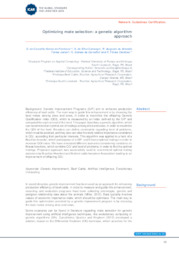Optimizing mate selection: a genetic algorithm approach.
Optimizing mate selection: a genetic algorithm approach.
Authorship: FONTOURA, D. de C. N. da; CAMARGO, S. da S.; TORRES JUNIOR, R. A. de A.; CARVALHO, H. G. de; CARDOSO, F. F.
Summary: Background: Genetic Improvement Programs (GIP) aim to enhance productionefficiency of beef cattle. The main way to guide this enhancement is by choosing thebest mates among sires and cows, in order to maximize the offspring GeneticQualification Index (QGI), which is measured by an index defined by the GIP andcomputed for each animal of the herd. This paper describes a genetic algorithm, whichcan recommend an optimal set of matings among sires and cows, in order to maximizethe QGI of the herd. Breeders can define constraints regarding level of problems,which must be avoided, and they also can alter the traits relative importance consideredin QGI, according their particular interests. This algorithm was applied to a herd of aBrazilian breeder, which participates of a GIP, and it found optimal matings in order toincrease QGI value. We have simulated different scenarios considering variations onfitness functions, which combine QGI and level of problems, in order to find the optimalmatings. Proposed approach was successfully used to recommend optimal matingdecisions by Brazilian Hereford and Braford cattle breeders Association leading to animprovement of offspring QGI.Keywords: Genetic Improvement, Beef Cattle, Artificial Intelligence, EvolutionaryComputing.
Publication year: 2019
Types of publication: Artigo em anais e proceedings
Keywords: Acasalamento Controlado, Análise, Bovino, Gado de Corte, Performance
Observation
Some of Embrapa's publications are published as ePub files. To read them, use or download one of the following free software options to your computer or mobile device. Android: Google Play Books; IOS: iBooks; Windows and Linux: Calibre.
Access other publications
Access the Agricultural Research Database (BDPA) to consult Embrapa's full library collection and records.
Visit Embrapa Bookstore to purchase books and other publications sold by Embrapa.

